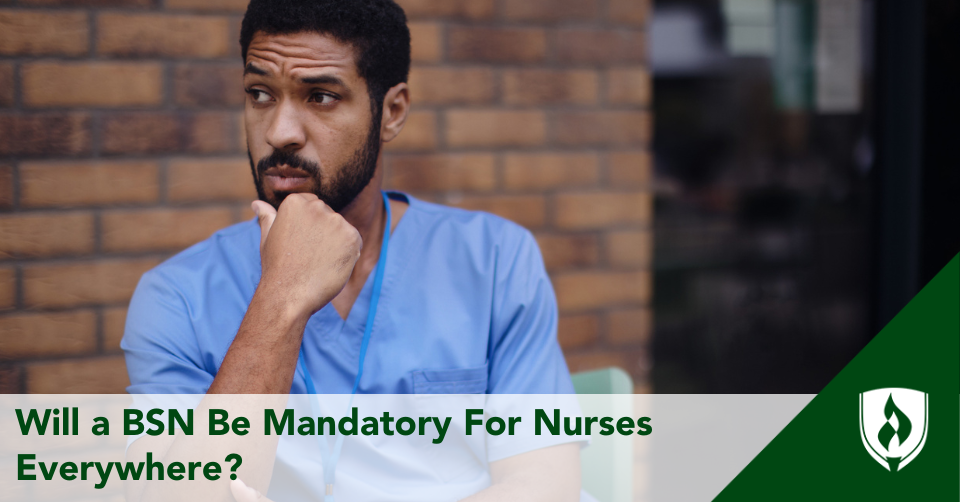
The short answer? No. A Bachelor of Science in Nursing (BSN) will not be mandatory for most nurses anytime soon. That said, there is a push for more BSN-prepared nurses across the country—and there is one U.S. state where it’s mandatory now.
In 2017, Andrew Cuomo signed the BSN in 10 law, requiring all New York nurses to receive a BSN within 10 years of becoming a nurse. Rhode Island, New Jersey and some other states are said to be considering similar bills, though nothing has been set in stone.
Despite not being mandatory, industry trends do show an overall increase in BSN nurses. The percentage of RNs with BSN degrees or higher in the U.S. workforce exceeded 70% for the first time in April 2023, according to results from the 2022 National Nursing Workforce Survey. Now, more than half (51%) of nurses first enter the workforce with a BSN or entry-level master’s degree.1
If you’re interested in going to nursing school and were planning on getting your Associate’s Degree in Nursing (ADN) to become a registered nurse (RN), you may be concerned that you need—or that all future nurses will soon need—a BSN. The truth is, unless you intent to practice nursing in New York, it’s really up to you.
Nurses of all credentials are both vital and valuable in today’s healthcare industry, especially amid the continuing nursing shortage. Whether you decide to pursue your ADN or BSN, you’ll play an integral role in the nursing workforce and greater health system. As you consider your options, learn a little more about the BSN below and a few reasons you may want to obtain one. Read more about the benefits of a BSN degree.
Breaking down the BSN Degree
A BSN is an undergraduate-level degree for RNs. You can earn a BSN in a standard four-year bachelor’s degree program, through a secondary bachelor’s degree program, as well as through both LPN to BSN and RN to BSN bridge programs.
Whatever stage you’re at in your education and nursing career, a BSN is a bachelor’s degree that specifically prepares you to work as an RN with added leadership responsibilities. RNs with their Bachelor of Science in Nursing are often referred to as BSN RNs, BSN-prepared nurses or baccalaureate-prepared nurses.
Reasons you may want to invest in a BSN
It’s required in certain nursing settings
While nurses of any credentials can practice across a range of settings (think: hospitals, community clinics, home health services and beyond), BSN nurses tend to have even more options and flexibility in where they can work.
From Magnet hospitals to the U.S. military, certain settings have specific requirements around nurses having their BSN—regardless of state-specific laws.
Every Magnet hospital in the U.S. requires all nurse managers and nurse leaders to hold either a BSN or graduate degree in nursing, and the U.S. Army, U.S. Navy and U.S. Air Force all require active-duty Registered Nurses to have their BSN. The same is true for commissioned officers within the U.S. Public Health Service.1
Of course, if you don’t plan on working in any of these settings you don’t need to become a BSN nurse. These requirements are simply worth being aware of as you make your way into the industry as a registered professional nurse.
A BSN program can expand your scope of practice
In addition to opening doors to certain work settings, a BSN can lead to a wider scope of practice within the nursing profession. BSN programs typically cover all the material taught in associate degree in nursing (ADN) and practical nursing (LPN) programs, plus a deeper dive into the physical and social sciences as well as areas like nursing research and public health.
This expanded coursework provides students with a better understanding of the cultural, political, economic and social issues that affect patients and influence healthcare delivery.1
With a more extensive curriculum, BSN nurses are prepared to accept and practice a broader range of responsibilities, including managing new health technologies, home healthcare decision-making, post-op and preventive care and care plan coordination. This goes hand in hand with more workplace autonomy and independence across the realm of nursing duties—from clinical decision-making to case management and bedside care.
If you're interested in holding more of a leadership position in a nursing practice and having greater independence with patient care, a diploma nursing program like a BSN may be the right choice for you.
A BSN can help improve your patient outcomes
Though some are skeptical about whether a BSN degree can really help you improve patient outcomes, research seems to indicate that it does. Having a higher proportion of baccalaureate-prepared nurses in hospital settings—regardless of their educational pathway—is associated with lower rates of 30-day inpatient surgical mortality.1
These statistics suggest that a BSN can help nurses contribute to better patient outcomes. But it’s also worth noting that a higher presence of nurses in general also has demonstrated positive effects a healthcare facility’s outcomes.
That’s a very notable struggle for many healthcare systems in the nursing shortage. We need more nurses. Full-stop.
A BSN is a stepping stone to further education
It’s probably no surprise that most graduate nursing programs require applicants to hold a BSN. In the nursing profession, higher education typically goes hand-in-hand with pursuing more specialized roles. Even if graduate-level nursing education isn’t in the cards for you now, it may be one day—especially as working in different healthcare settings exposes you to more niche areas of nursing.
If someday you decide to become a nurse practitioner, rise up the ranks of hospital leadership or become a specialty-focused advanced practice registered nurse (APRN), a BSN will provide a starting point.
Choose the nursing credentials that work for you
Though a BSN may be something you consider down the line, it doesn’t have to be where you start your nursing education.
Even in New York, nurses are given time to practice as an LPN or RN before pursuing a bachelor’s degree in nursing. Nurses of any and all credentials are needed in today’s healthcare industry, so don’t let the push for BSN-prepared candidates deter you from entering the field at a different stage.
But if you’ve been looking for an extra reason to invest in a BSN program, we can give you twelve.
There’s a lot to consider when you are choosing your nursing education options. For a more granular look at what nursing programs can be like, check out “11 Facts You Didn't Know About the Rasmussen University Nursing Programs.”
Or, if you want to cut past the research and get your questions answered, register for a Nursing Information Session—we’ll answer all your questions about the different programs available.
1 American Association of Colleges of Nursing, Fact Sheet: The Impact of Education on Nursing Practice [Accessed August 2023] https://www.aacnnursing.org/Portals/0/PDFs/Fact-Sheets/Education-Impact-Fact-Sheet.pdf




